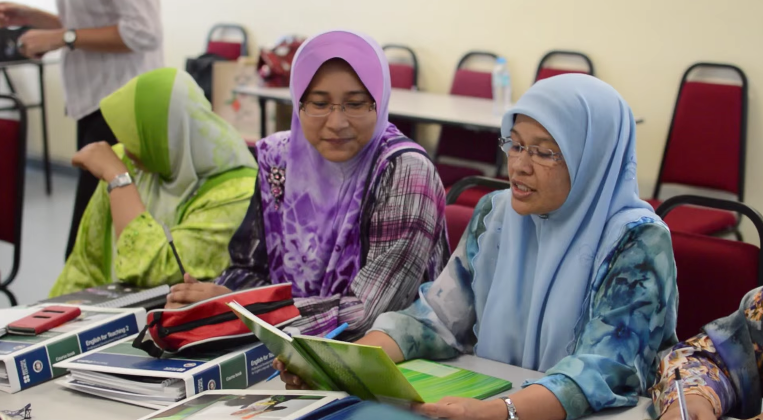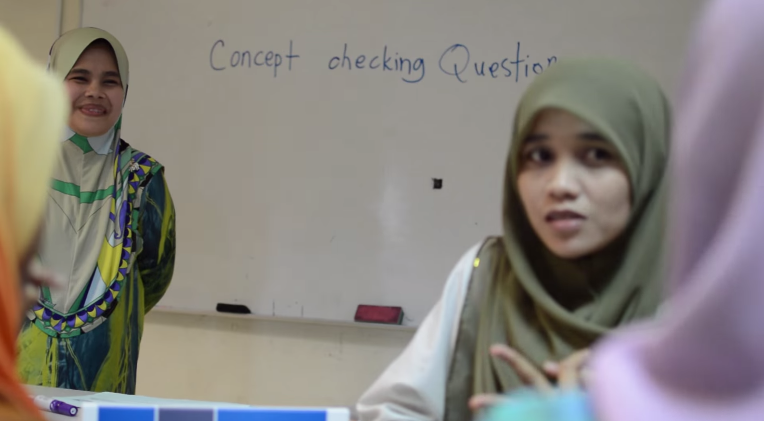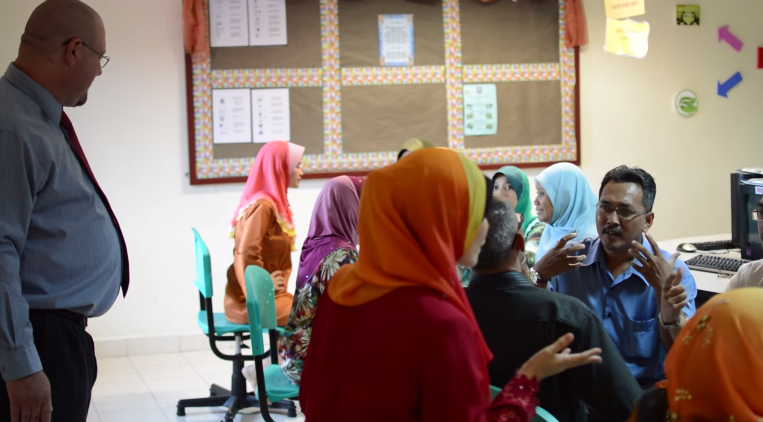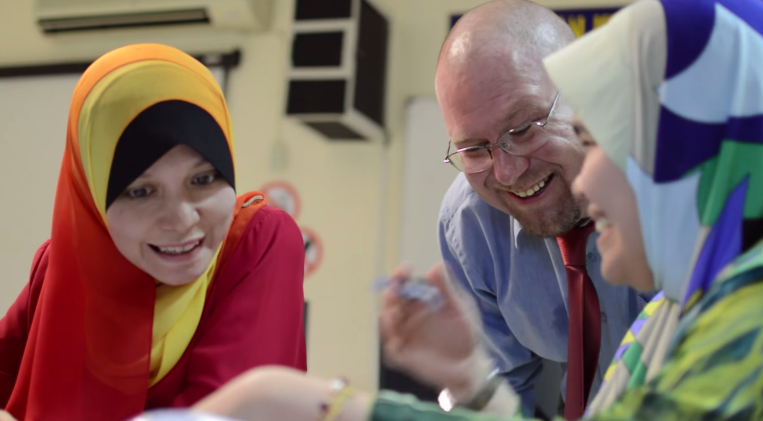SAYS EXCLUSIVE: The Hard Work And Dedication Of English School Teachers No One Talks About
SAYS' Mei Mei Chu talks to the British Council about their collaboration with the Ministry of Education to upgrade the standards of Malaysian English school teachers.
Early this week, 9 December, Education Minister Tan Sri Muhyiddin Yassin was puzzled at the fact that graduates are still struggling to speak in English
Something must be wrong with the education system if students are still struggling to communicate in English, despite nearly two decades of learning the subject, Education Minister Tan Sri Muhyiddin Yassin said.
“They start learning English at pre-schools, and then they move on to primary and secondary schools... they should have the basic knowledge and they continue learning the language in universities... that is another four to five years... there should not be a problem." When students move on to higher learning institutions, the focus should be on "upscaling, polishing and improving" the command of the language, he said. "I don't think the number of hours is insufficient if you take into account the 18 to 19 years of learning process," he said. "Something is not right," added the deputy prime minister.
Muhyiddin was unable to identify the problem but cited teachers and students who are uninterested in the subject as a possible cause
Unable to pinpoint the root of the problem, Muhyiddin said today proficiency in the English language could be due to a myriad of causes, including teachers and students — who are uninterested in the subject.
The deputy prime minister seemed to have echoed the nation's general perception and stereotype of Malaysian school teachers, especially those who teach English
When SAYS asked Malaysians what were their perception of school teachers, the answers we got were mainly negative - traditional, conservative, uninterested, lack of passion, outdated, overworked, and underpaid.
The British Council begs to differ. They were eager to dispel these negative perceptions of school teachers and gave an insight to why Muhyiddin was baffled at the poor grasp of English amongst students.
"Malaysian school teachers are working extremely hard, they are very dedicated, they believe in what they do, and want the best for their pupils. The sense of responsibility they feel towards their pupils is really inspiring," says Micheal Charters from the British Council.
For the past two years, the Ministry of Education has been collaborating with the British Council in a massive project to upskill English language teachers called Pro-ELT
Pro-ELT, the Professional Upskilling of English Language Teachers project, aims to strengthen English language teaching and learning in primary and secondary school across Malaysia through the professional development of teachers' methodology and language proficiency.
Selected English language teachers nationwide undergo training by the Britsh Council to improve their teaching methodology and language proficiency. In urban areas, training takes place once a week for a full year; in rural areas, teachers are extracted from their schools and placed in the training centre for a four-month intensive course. Besides face-to-face training with their peers, there is also an online component in the programme.
Irma Horvath and Micheal Charters from the British Council tell SAYS that this initiative, in line with the National Education Blueprint's mission to ensure every child is proficient in English, is forward-thinking
Irma Horvath, Academic Operations Manager Pro-ELT: The standard the Ministry of Education has set for teachers to achieve by the end of Pro-ELT is advanced, which is amazing. Most countries set their levels much lower, it’s a real forward-thinking initiative in the sense that instead of bringing foreign teachers to teach students, they are teaching teachers.
Micheal Charters, Pro-ELT Coordinator: If you look at it globally, it’s rare for a government to say we’re going to take teachers out of a classroom and put them one day a week in a training room for a whole year to improve their methodology and subject knowledge. That’s really unusual. Most education ministries would not take on that kind of endeavour and would probably do something on a smaller scale. It’s a real commitment that is being shown here.
Over the past two years, 180 Pro-ELT trainers have trained 14,000 Malaysian school teachers. Throughout the training, there was not one uninterested or close-minded teacher spotted.
Micheal: I certainly haven’t seen teachers being closed-minded. The perception that teachers are traditional and uninterested is not what I've seen in the classrooms. I’ve seen them being completely open-minded and take on new technology and discuss new methods. Teachers are very keen to get involved and learn new things, they are very curious about different teaching methods, different approaches to the same questions, and have a very positive attitude towards learning new language skills and new methodology. We found teachers who have been in the job for 25 years who were completely open to new ideas and new methods. It's really inspiring to see that.
In fact, trainers are filled with stories that are testimonials of the dedication, commitment, and passion that the teachers have put into improving themselves for the sake of their students
Irma: Teachers are so incredibly dedicated and committed to this experience. When I met a group of teachers, their only problem with being on Pro-ELT was that they have to leave their students behind, they feel personally responsible to the improvement of their students. The number of times when I saw teachers, even those in decentralised modes where they are extracted for a whole month, going back to their schools to help their students. They feel that they have to do everything they can to help these children succeed. It's incredible and incredibly touching. Some travel two hours by boat to attend the Pro-ELT class, some find Internet cafés at their islands that don't have electricity and wait for the transistor to come to do their online course.
One older teacher who is a single mother with 11 children, works full time yet finds time to consistently attend the course. Before the course, she had never sent an email in her life but now she is completing online courses every week.
Micheal: One teacher that I taught has 11 children, she’s a widow, six of them are still in school, and she’s working full time as a teacher. She attends the course for a day a week. Before the course, she’s never sent an email before, never had an email address, and now she’s completing online courses every week. She even finds time to bring food to the lessons to share with the other teachers. Incredibly dedicated person, I don’t know when she sleeps, I think she works all day. And this is someone who has been in the profession for a long time and is still completely open to this new approach. She was really dedicated.
The biggest challenge teachers face is not poor English proficiency, but rather a lack of confidence
Micheal: The english proficiency varies from teacher to teacher and in terms of individual skills. It depends on the individual teacher. Teaching is a demanding profession in any country. In terms of language skills, we find that writing and speaking are two areas that teachers may lack confidence with. They have the knowledge and language, but lack confidence when speaking it. They lack the confidence to apply what they already know and to develop what they have.
The teachers, some who have been teaching for over 20 years, are now challenging themselves and attempting new teaching methods with their class of 40 children. Their eyes would sparkle with enthusiasm and joy when the class responds to a new activity.
Irma: At the beginning of the course, some teachers don't even have an email address. Fast-forward to 6 months later, they are planning lessons online, bringing tools into their classrooms and venturing out, taking their students to computer labs, showing them different ways of dealing with things. Teachers who were taught in a traditional way, who would do chalk and talk and lecture, now have the courage to say “I'm going to attempt a communicative activity with my 40 children”. They are creating flashcards and staying after class to finish board games which they can use in class and they go back to trainers with sparkles in their eyes saying “It worked! They spoke in English!”
Micheal: There are so many moments with the teachers that I really love. I really like it when teachers come back to me and tell me “that activity we tried last week, I tried it with my pupils, they really enjoyed it! They keep asking me to do it again." The atmosphere in training rooms is so positive and so vibrant, they have such a great sense of humour and such great passion for their work, and they are absolutely dedicated to their profession and their classes.
That drive doesn't stop once the Pro-ELT training ends. Teachers keep in touch with each other and with their trainers via WhatsApp and Facebook groups where they continue exploring and sharing new ideas together.
Irma: In the Pro-ELT training, teachers realise that there are other teachers facing the same problem, they start to come up with solutions to solve those issues together. They become a community and these communities stay together even after the course. We still have stories of trainers from Pro-ELT 1 keeping in touch with their groups. They have WhatsApp groups, Facebook groups. It’s not just you attend the course and that’s it, you attend the course, and then you stay in touch with other teachers and you keep sharing new ideas, you keep exploring new things, and that will hopefully help in the long run.
It was evident that these British Council trainers are completely smitten with Malaysian school teachers
Irma: There is one thing I find really surprising, it’s their amazing sense of humour. These teachers are hilarious, they are so open to just making fun of themselves. Yesterday, for example, at 3.15pm the teachers felt a bit tired and they stopped the trainer and said “We would like an energiser.” The trainer said “Really? Now you would like an energiser?” The teachers stood up and delivered it themselves. If you walked into the classroom you would have seen teachers working with a song on YouTube projected and they are doing different movements, singing and dancing. That’s brilliant.
Last year, I was off sick and the teachers turn up with some chicken soup at my place. And they were like “You don't have your mother here to take care of your, here are some chicken soup, that will heal your soul”. And there are so many stories when we ask trainers why are you here, what do you enjoy about this job, they all say: “The teachers”. It’s such an amazing experience to work with these people and they really show us what you can do when you set your mind to it.
"They are putting in the hours, they are incredibly committed and determined," Irma says of our public school teachers. "It would be really nice if the wider community supported them too."
Irma: We would like the community, parents, 'guru besars' and students to encourage teachers to embark on this journey of improvement. They are putting in the hours, they are incredibly committed and determined, so it would be really nice if the wider community supported them in this.







